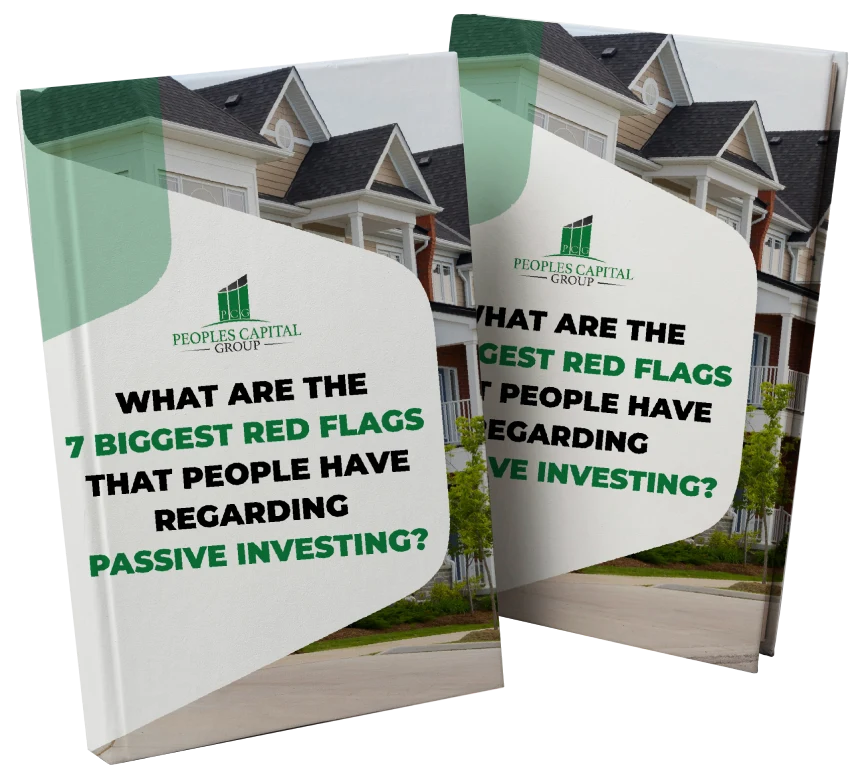
You’re a real estate investor because you want to make money. Perhaps you’re looking to quickly and effectively extract some cash from a temporary investment. Or maybe you’re looking to create a robust and lasting passive income stream.
Whether you want durable cash flow that appreciates over years, or a quick fix and flip house or townhome, your investing strategies need to include certain critical features.
At Peoples Capital Group, we understand how most investors think and feel, and more importantly, how they act. With 30 years of experience, we know that real estate investing can be frustrating, even if you’re a seasoned investor with a portfolio of successful transactions.
This is why we work with clients from all backgrounds to put their money into the most productive properties available. Through historically profitable investment properties, we help buyers and sellers capitalize on the real estate assets right for them.
Make the real estate industry your goldmine. Fight off recession and withstand the uncertainties of economic distress.
With the right real estate investing strategies today, you can begin building a wealth-generating machine for tomorrow.
Why Real Estate Investments Are Crucial for Your Success
Whether you’re just starting your deep dive into real estate investing or you’re a seasoned veteran of the game, it’s always good to remind yourself of why you’re doing it. Historical benefits of real estate investing are well-established, but given our current inflation uncertainty, these reasons are more important than ever.
Despite changes in real estate markets, industries, and financial conditions, real estate investors continue to enjoy one of the more stable and dependable vehicles for wealth accumulation.
Stability of Real Estate Investment Strategies
Real estate investing does not typically spike and plummet like the stock market. It is not subject to the same potentially volatile conditions as crypto. Real estate is known to appreciate and hedge against inflation.
This is why it’s a great investment during economic hardship.
Consistent Realty Demand
People always need property, whether commercial real estate, residential real estate, or some other physical real estate. Rental real estate such as apartment buildings is especially great for consistent cash flow.
Through monthly rental income, real estate investors have something to rely on. If you don’t currently own a monthly rental property, you can always purchase investment properties such as homes or townhomes, make improvements, and then sell them later or rent them.
Owning real estate is about owning income-producing properties. If done correctly, this passive investment strategy can generate reliable wealth for decades.
Equity, Wealth & Diversification in Real Estate Investing
In many cases, investment properties increase in cash flow as mortgage payments are made and equity is accumulated. When you move through mortgage payments, you are amassing equity. With equity comes the leverage to expand real estate investing and accumulate even greater wealth.
Real estate investing also helps you build a healthy diversified portfolio. With a strong, varied portfolio, you can offset the risks and downsides of riskier assets. As a good hedge against inflation, real estate investing does just that.
It doesn’t matter if you’re involved in commercial real estate investing or working on a residential realty investment, these property commitments have the potential to be lucrative.
In uncertain economic times, what’s better than a dependable cash flow?
Real Estate Investment Appreciation
The reason so many investors’ strategies are so successful is because of the nature of real estate in general. Physical real estate has the potential to generate positive cash flow for extended periods.
Residential, commercial, and industrial income-producing properties are all important aspects of a successful passive investment portfolio. Whether the real estate is publicly traded or is open only to private investors, it is more than likely to appreciate over time.
This means you can enjoy a profit when you finally sell it. With increases in market value and rent expected to continue, the appreciation of realty investments is a refreshing sign in these times of economic uncertainty.
How to Accelerate Real Estate Appreciation
Did you know that some homeowners expect the values of their property to increase by at least 30% in a decade?
Capital appreciation can occur for various reasons. This may be due to fluctuations in interest rates, improvements to the property, local infrastructure changes, shifts in economic circumstances, and more.
To increase appreciation of your investment property, consider upgrading, remodeling, or adding major areas, such as exterior features like decks, pools, and landscaping, and interior features, such as kitchens, bathrooms, and bedrooms.
Tax Advantages of a Real Estate Investment Strategy
Realty investments are well-known for their tax breaks and deductions. Let’s face it, managing real estate can be costly and time-consuming. Whether you use a property management company or not, there are likely always going to be unexpected fees and expenses.
Properties age. Problems occur. Maintenance and repair are required. Fortunately, there are many forms, mechanisms, and vehicles that exist to allow real estate investors some breathing room on taxes.
Real Estate Deductions, Deferrals, and Depreciation
Depending upon your investment property and investment strategy, you may deduct mortgage interest, advertising costs, taxes, maintenance expenses, insurance fees, utility bills, and more. You can also depreciate your property over time to deduct the property’s price and expenses associated with improving it.
You can even use what is called a 1031 Exchange to defer capital gains taxes. This works by allowing you to roll over the proceeds of a sold property into a new investment property. If all your proceeds go into a property of equal or greater value, you can 100% defer your capital gains.
Some investors even invest in property tax liens. As one of the riskier real estate assets, tax liens can be profitable but only if you know what you’re doing.
It’s best to consult with a realty expert before purchasing property tax liens. In general, you should consider consulting professionals about any property investments you have in mind.
With the right real estate investment strategy used over time, any real estate investor can make significant gains in his or her investment portfolio and cash flows. A top real estate investment group is ready to help.
If you’re a real estate investor looking to make quick cash, sustain a rental income, or employ other real estate investing strategies, the following strategies may be perfect for you.
Best Strategies for Real Estate Investments in 2022

Any investor in 2022 knows how difficult things have become. Resources are becoming scarcer, prices are increasing, and individuals and families everywhere are struggling. As the economic uncertainty looms, many people are turning to alternative means of wealth generation.
Fortunately, real estate continues to offer an inflationary hedge, reliable income streams, and potential for portfolio diversification that real estate investors want and need.
Preparing for Realty Investment
It doesn’t matter if you choose residential rental properties, commercial real estate, or publicly traded REITs, real estate investments can help your financial situation significantly.
Your asset class, ability to generate income, and investment objectives may vary. However, with the help of a leading real estate investment group on your side, you can make the most of the best real estate investing strategies available.
Here are the top realty investment strategies to make money in 2022 and the years and decades that follow.
Rental Property
As one of the more common forms of real estate investing, rental properties are a relatively easy and reliable way to earn rental income that persists. When it comes to renting, there are many opportunities and variables.
You can rent out a house, you can rent out apartment buildings or units.
Just be mindful of several things before you begin investing in rental property.
Important Rental Property Considerations
Your prospective rental property should generate a monthly rent that is higher than the monthly expenses on mortgages, insurance, and property tax.
You may have to find a place in a high-rent area or make a large down payment so that the numbers make sense.
Rental Debt Snowball
By using the rental debt snowball strategy, you can put all of your cash flow and additional savings into paying off the mortgages. The rental debt ‘snowball’ strategy requires that you pay off your smallest real estate debt first and then snowball into paying off the bigger ones.
You can also use online services that list single-family and multi-family rental properties with pre-established tenants and income streams. This can practically guarantee future results that you’ll like.
In some cases, you may even elect to invest in a clearly undervalued property.
Tax Liens
A property with a tax lien may offer benefits such as rate of sale, leverage, and lack of competition, but a tax lien can also be very risky. Depending upon your risk tolerance, a property with a tax lien may not be the right choice.
Tax liens can consume equity rapidly and there are often unforeseen issues with other outstanding bills, fines, fees, and expenses. A tax-delinquent property may have a tremendous upside, but it can also be an unbelievable nightmare.
Tenants and Maintenance
Also remember, with every rental property, you have to manage tenants and maintenance costs.
If you’re investing in an apartment complex, a property management company can help you. A leading property management company will be able to screen and manage tenants, fix and repair property issues, and generally streamline the entire rental ownership process.
Overall, rental properties and units have the potential to bring you a trusted, robust rental income. Owning real estate is rarely a cakewalk, but with the help of top real estate investing minds, you can make the most of your rental properties.
House Flipping and House Hacking
You’ve probably seen shows on T.V. where real estate gurus fix and flip homes. Typically, they’re shown smashing the place apart, rebuilding it into something spectacular, and then selling it for a fantastic profit. This is called house flipping.
In other cases, you may see or hear of individuals who rent out their homes or parts of their property. In some cases, they may own separate adjacent property and rent that out. People even receive rental income from small rooms or basements. This is called house hacking.
House Flipping
With property values rising again, flipping can be a wise investing strategy. Whether you’re a beginner real estate investor, former real estate agent, or just somebody with a lot of money, flipping may be right for you.
Hard money lending can help as well.
The trick is to locate bargain properties that require minimal fixing. This allows you to minimize improvement time and expenses and sell as quickly as possible. However, you must be prepared for delays. Sometimes homes don’t sell, and you’re left holding the bag.
You may also choose a live-in-flip property. This is better for the long-term, as you make the live-in-flip property your primary residence while you improve it for the eventual sale or rental period.
Before you begin fixing, flipping, or living in, consult an expert in investment realty.
House Hacking
With house hacking, the sky’s the limit. Aside from restrictions imposed by available tenants, zoning laws, and HOA rules and regulations. Once you’re sure you’re abiding by the necessary rules, the ‘hack’ is up to you.
Do you have undeveloped land you want to rent out? Do you have a nice den in your primary residence or property near your primary residence that you don’t use that could generate income? Do you have property perfect for VRBO or Airbnb?
House hacking is a great way to build equity, enjoy passive income, and increase your savings for greater investments.
Scale Up Your Real Estate Investing
Through partnerships, syndications, real estate investment groups, and networks, you can team up with other investors. These larger real estate opportunities also afford you the ability to make connections with various industry professionals, including real estate developers, agents, brokers, lenders, bankers, lawyers, contractors, and more.
Aside from the increased potential for higher profits, monthly rent, and improved real estate portfolios, larger real estate investing deals are great for two main reasons.
Affordable Minimum Investments
Many times, you may only need to put down an initial investment of $500 for the entire property.
Depending upon the asset, investor agreement, and local laws, rules, and regulations, you may be able to purchase everything from massive office buildings to stunning, undervalued properties.
No Accreditation Required
For certain investment properties, you once needed to be an accredited investor. This means you had to meet certain income, net worth, experience, and certification requirements.
Not any longer. Although still in place for some investment types, you can now invest in large properties with minimal money and experience. Even if you have bad credit or a poor past performance with investments, you may still be able to invest in lucrative, large-property deals.
Through a Tenants In Common (TIC) agreement, you can hold a percentage interest in a property. This can help you determine how much control you have based on your share of the investment.
Consult leading real estate investment groups before doing this. They may be able to guide you toward the real estate investing strategies that fit your needs and circumstances.
Real Estate Wholesaling
With real estate wholesaling, you become the wholesaler. This means you acquire a contract for both buyer and seller. Wholesale properties are typically those that are no longer on the market. The owner may not have the time or resources to undergo a typical transaction.
This is where you can come in. You become the middleman, usually dealing with buyers or other investors who want to avoid the nuisance of negotiating, identifying properties, and so forth.
Typically, the wholesaler will profit from the difference between the contract price for the seller and the selling price the buyer pays. At no point does the wholesaler purchase the property.
When wholesaling, just make sure you don’t act as a licensed real estate agent if you lack the qualifications and credentials. Consult a local firm about the real estate laws in your area.
Real Estate Investment Trusts (REITs)

Although many investors get involved in real estate because of its lower risks compared to other assets and investments, there is still an option for those interested in the stock market.
For investors who like to remain more detached, real estate investment trusts (REITs) are the way to go.
What Is a REIT?
Simply put, an REIT is a company that owns and often operates real estate. The real estate owned produces an income and is often commercial, such as office buildings, motels and hotels, apartment complexes, warehouses, shopping centers, and more.
As in other industry investments, any person can own or finance these properties through stock purchases. Some investors may also choose a real estate mutual fund, which can differ from a real estate investment trust.
REITs are directly invested in real estate through ownership, operation, and/or financing. Real estate funds, however, are not directly invested. Rather, they invest through REITs and other related securities.
The real estate investment trust typically takes one of three forms.
Types of REITs
These funds allow investors to invest in either equity, mortgages, or hybrid securities. There are several main differences between them.
- Equity REITs
These are the majority of REITs. They own and manage real estate with revenues coming mostly from rental income. - Mortgage REITs
These REITs lend money through mortgages, loans, and various securities. Earnings are derived from the difference between mortgage loan interest and mortgage loan costs. - Hybrid REITs
These REITs combine both mortgage and equity characteristics. They may own income-generating properties while also providing capital for builders and owners.
If you have any questions about real estate investment trusts and stocks, how companies sell securities, or anything else REIT-related, consult an expert in realty investing.
Making the Most of Your Investment
Overall, there are many ways to invest in real estate. They may differ significantly depending upon your individual needs and goals, the markets and properties in play, and the resources, time, and money required.
At Peoples Capital Group, we have helped real estate investors just like you maximize their income streams through historically profitable property investments.
Enjoy the advantages of a leading investment firm. Rather than go it alone, receive the guidance of seasoned professionals. Begin accumulating wealth, avoiding tax consequences, and optimizing your hard-earned money now.
If you want to make a smart, profitable, and enduring investment, but don’t know where to begin or how to proceed, you have nothing to fear. Our team of consummate investment specialists knows the industry and markets and have 30 years of experience to prove it.
Let’s make the most of your capital Contact us today.





